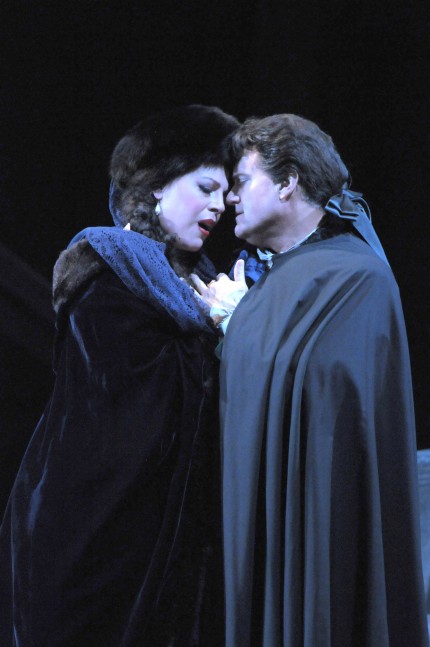With Radvanovsky and Fisch, Lyric’s “Masked Ball” is the right ticket

For dramatic and theatrically effective middle-period Verdi, how can one do better than Un ballo in maschera? In addition to an offbeat story gracefully mixing political intrigue and a fatal love triangle, A Masked Ball contains terrific music for tenor, two drop-dead arias for soprano, and arguably Verdi’s greatest baritone aria. Throw in an onstage royal assassination and you really can’t go wrong.
And the Lyric Opera of Chicago didn’t go wrong Monday night at the Civic Opera House with the opening of its new production of Un ballo. And while the staging gave room for some quibbles, with a cast that ranged from solid to exceptional, and crackling musical direction from conductor Asher Fisch, the Lyric’s Masked Ball largely delivers the Verdian goods.
Of course, having Sondra Radvanovsky as Amelia is all gain. There are few singers better suited to this repertoire than the Berwyn-born soprano and so she proved it again, as Renato’s tormented wife, who is in love with his best friend, the Swedish king, Gustavus.
If her account of Amelia’s Ma dall’arido stelo divulsa was a bit expressively bland for all the tonal resplendence and technical poise, the soprano went from strength to strength afterward. Her gleaming top notes were thrilling in the ensuing love duet and Radvanovsky’s searing rendition of the showpiece, Morro, ma prima in grazia was the highlight of the evening, beautifully sung and emotionally riveting. (Too bad about the jarringly sour cello solo.) Amelia is not a role that offers much dramatic range, but even with much of her time spent in shadow in this darkly lit staging, Radvanovsky made her presence felt.
The hearty, good-natured King Gustavus is an admirable role for Frank Lopardo, fitting the American tenor’s voice and stage style. If not always the most individual or distinctive of artists, he was in fine voice Monday night, apart from a tenuous high note in his Act 3 aria. Lopardo sang with ardent tone and firm commitment, and was at his best in the love duet with Radvanovsky, both singers cutting loose with big volume and clarion top notes.
Mark Delavan has sung all the major Verdi baritone roles, and in these performances is making his role debut as Renato. Delavan proved worthy dramatically in a tricky role as the king’s adviser who turns into his mortal enemy when he suspects his wife of having an affair with Gustavus.
Delavan’s burly voice sounds rather low and unwieldy for Renato, a baritone role that requires more refinement and precision at the top end. If not the most grateful role for him vocally, Delavan sang with dramatic force and brought off a compelling turn in his Act 3 aria, Eri tu.
Amazingly, Stephanie Blythe is making her belated Lyric Opera debut as Ulrica in this production. While Blythe’s diamond-bright mezzo doesn’t possess the dusky contralto-like color for the witchy fortune teller, her luxuriant, finely focused singing was a pleasure in this brief appearance. (And she’ll be back next month in a comic turn, as Katisha in The Mikado.)
Ryan Center alum Kathleen Kim has the flexible high soprano and vestpocket physical stature for Oscar. Kim sang with impressive agility in her arias, but–possibly overdirected by Renata Scotto—her capering about and mimicking of the king in Act 1 was more irritating than charming.
As the conspirators, Sam Handley and Craig Irvin were a worthy duo. The traditional set, borrowed from San Francisco Opera, gets the job done, and there was exceptional ensemble singing by the Lyric Opera Chorus, under the direction of Donald Nally as well.
Now in her second career, the celebrated Scotto’s stage direction proved the most variable element of the evening. Sometimes her movement of the chorus and principals was non-fussy and straightforward, and she deftly skirted some of the opera’s improbable absurdities.
Other times, Scotto’s direction felt stagy and old-fashioned and, at times, just plain sloppy, as with the candelabra blocking Lopardo’s face at the beginning of Act 3. The mimes and dancers in the masque scene were a visual distraction at the climactic moment of the opera, as was the corny and redundant flag-waving at the end of Act 1.
The Lyric Opera has seen some inspired conducting this season, but Asher Fisch’s direction of the orchestra was magnificent across the board. Fisch provided a virtual seminar in Verdi conducting, lilting in the lighter moments yet powerful, richly textured, and often startling in its dramatic intensity.
Un ballo in maschera runs through Dec. 10. lyricopera.org; 312-332-2244.
Posted in Performances





Posted Nov 16, 2010 at 8:41 am by Laura
As a professional musician who has performed in the Chicago area for over 25 years and who was at the Ballo opening last night, it was a revelation to read Mr. Johnson’s comment about the “jarringly sour cello solo”. To my highly trained ears, it was a soaring and achingly beautiful interpretation of Verdi from one of the most distinguished cellists that I’ve had the privilege of hearing.
The cellist does not need anyone to defend the performance as the playing literally spoke for itself. One is tempted to allow the review to remain without comment, not dignifying it with a response. However, rather than leaving the readers of this website with the impression that something was amiss last night, there are those of us who would wholeheartedly disagree with Mr. Johnson’s assessment. It would be a disservice to allow one sentence to mar the reputation of this amazing artist.
Posted Nov 16, 2010 at 11:33 am by Bob Radvanovsky
I am looking soooo forward to seeing and hearing my sister perform!